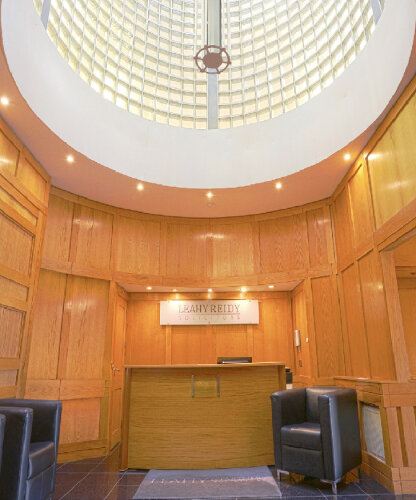Best Toxic Mold Lawyers in Limerick
Share your needs with us, get contacted by law firms.
Free. Takes 2 min.
List of the best lawyers in Limerick, Ireland
About Toxic Mold Law in Limerick, Ireland
Toxic mold refers to certain types of mold that can cause adverse health effects due to the toxins they produce. In Limerick, as in the rest of Ireland, toxic mold is often encountered in residential and commercial buildings with water damage or high humidity. Exposure to toxic mold can result in respiratory issues, allergic reactions, and other serious health concerns. Irish law places specific responsibilities on landlords, property owners, and employers regarding mold prevention and remediation, particularly when it comes to ensuring a safe environment for occupants and workers.
Why You May Need a Lawyer
Legal advice or representation can be crucial in situations involving toxic mold, such as:
- Disputes between tenants and landlords about mold-infested accommodation and the duty to repair or remediate.
- Health claims arising from mold exposure at home or in the workplace.
- Insurance disputes when a policyholder’s claim regarding mold damage is denied or inadequately covered.
- Litigation involving builders or contractors if mold issues are linked to defective construction.
- Cases involving schools or public buildings where mold presents a risk to students or staff.
A lawyer can help navigate the complexities of Irish housing, health, and safety laws, negotiate settlements, or pursue compensation for losses and medical costs.
Local Laws Overview
Limerick property owners, landlords, and employers must comply with several legal obligations relevant to toxic mold:
- Landlord and Tenant Law: The Residential Tenancies Act 2004 and its amendments require landlords to maintain rented properties in a habitable state. This includes addressing water ingress and damp that may lead to mold growth.
- Occupiers’ Liability: Property owners owe a duty of care to visitors and occupants. Failure to address structural issues or leaks resulting in toxic mold could render them liable for injury or loss.
- Health and Safety Regulations: The Safety, Health and Welfare at Work Act 2005 obligates employers to provide safe workplaces. This extends to occupational exposure to mold.
- Building Regulations: These set minimum standards for ventilation and moisture control in new builds and renovations.
Remediation of mold is expected where its presence poses a threat to health. Inaction can lead to legal claims or involvement from local authorities, such as Limerick City and County Council, particularly where public health is at risk.
Frequently Asked Questions
What is toxic mold?
Toxic mold is a type of fungus, often including species like Stachybotrys chartarum, that produces harmful mycotoxins. Prolonged exposure can lead to health problems.
What health problems can toxic mold cause?
Common health issues include respiratory problems, sinus infections, allergic reactions, headaches, skin irritation, and, in severe cases, neurological issues.
Who is responsible for addressing toxic mold in a rented property?
In Ireland, landlords are generally responsible for repairs and maintenance required to keep the property habitable. Tenants should promptly notify landlords of any damp or mold issues.
What should I do if my landlord is not addressing a mold problem?
If your landlord fails to remedy mold issues, you may file a complaint with the Residential Tenancies Board or seek legal advice to pursue compensation or enforcement.
Can I claim compensation for health problems caused by toxic mold?
Yes, you may be able to claim compensation for injuries, medical expenses, or losses if there is evidence that neglect or a breach of duty by a landlord, employer, or other responsible party caused your exposure.
How do building regulations in Limerick help prevent mold?
Irish building regulations require proper ventilation and moisture control in all buildings. Compliance helps prevent conditions conducive to mold growth.
Does my home insurance cover mold damage?
Coverage varies by policy. Mold resulting from sudden and accidental incidents may be covered, but gradual wear and tear or negligence is often excluded. Review your policy or consult your insurer.
Can I refuse to pay rent due to mold problems?
It is not advisable to unilaterally withhold rent, as this could breach your tenancy agreement. Instead, seek legal advice or contact the Residential Tenancies Board for guidance.
What can employers do to protect workers from toxic mold?
Employers must assess and address risks of mold exposure in the workplace, perform remedial works if identified, and inform employees of potential hazards under Irish health and safety law.
Who can I contact for inspection of mold issues in my home?
You can contact Limerick City and County Council’s housing department, a registered environmental consultant, or an independent property inspector for assessment.
Additional Resources
People seeking information or assistance regarding toxic mold in Limerick can access the following resources:
- Limerick City and County Council: Provides advice on housing standards and investigates complaints about rental property conditions.
- Residential Tenancies Board (RTB): Offers dispute resolution services for tenants and landlords, including issues like mold.
- Health Service Executive (HSE): Offers general information regarding public health issues, including exposure to mold.
- Environmental Protection Agency (EPA) Ireland: Provides environmental advice and guidance relating to indoor air quality.
- Citizens Information: Delivers general guidance on tenancy rights and landlord obligations in Ireland.
Next Steps
If you are facing issues related to toxic mold in your home or workplace in Limerick, consider the following steps:
- Document the presence of mold with photographs, medical reports, and correspondence about the issue.
- Notify your landlord, employer, or building manager about the problem in writing and keep records of all communication.
- Seek a professional inspection to identify the type and extent of the mold and possible health risks involved.
- Contact local authorities or relevant bodies if your complaint is not addressed promptly.
- Consult a solicitor with experience in property, housing, or personal injury law to discuss your options for remedy or compensation. Most offer initial consultations to assess your case.
- If necessary, pursue a formal complaint or legal action using the evidence and professional advice you have gathered.
Timely action is important to protect both your health and your legal rights. Do not delay in seeking help if you suspect exposure to toxic mold in Limerick.
Lawzana helps you find the best lawyers and law firms in Limerick through a curated and pre-screened list of qualified legal professionals. Our platform offers rankings and detailed profiles of attorneys and law firms, allowing you to compare based on practice areas, including Toxic Mold, experience, and client feedback.
Each profile includes a description of the firm's areas of practice, client reviews, team members and partners, year of establishment, spoken languages, office locations, contact information, social media presence, and any published articles or resources. Most firms on our platform speak English and are experienced in both local and international legal matters.
Get a quote from top-rated law firms in Limerick, Ireland — quickly, securely, and without unnecessary hassle.
Disclaimer:
The information provided on this page is for general informational purposes only and does not constitute legal advice. While we strive to ensure the accuracy and relevance of the content, legal information may change over time, and interpretations of the law can vary. You should always consult with a qualified legal professional for advice specific to your situation.
We disclaim all liability for actions taken or not taken based on the content of this page. If you believe any information is incorrect or outdated, please contact us, and we will review and update it where appropriate.












